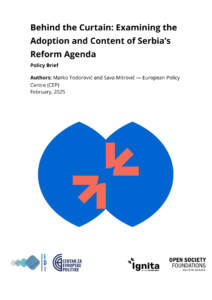 This paper will critically examine the development and adoption process of the Reform Agenda, focusing on its inclusiveness, analysing its content, and assessing the mechanisms designed for its implementation and monitoring. Particular attention will be given to the role of civil society in ensuring accountability and transparency. By addressing these aspects, the paper comprehensively analyses the Reform Agenda’s significance within Serbia’s EU integration efforts. Ultimately, it concludes that while the Reform Agenda represents a notable milestone in Serbia’s path to EU membership, its development and adoption were characterised by insufficient inclusiveness and transparency. The success of its implementation will depend on the government’s capacity to address these shortcomings and foster meaningful engagement with all stakeholders.
This paper will critically examine the development and adoption process of the Reform Agenda, focusing on its inclusiveness, analysing its content, and assessing the mechanisms designed for its implementation and monitoring. Particular attention will be given to the role of civil society in ensuring accountability and transparency. By addressing these aspects, the paper comprehensively analyses the Reform Agenda’s significance within Serbia’s EU integration efforts. Ultimately, it concludes that while the Reform Agenda represents a notable milestone in Serbia’s path to EU membership, its development and adoption were characterised by insufficient inclusiveness and transparency. The success of its implementation will depend on the government’s capacity to address these shortcomings and foster meaningful engagement with all stakeholders.
